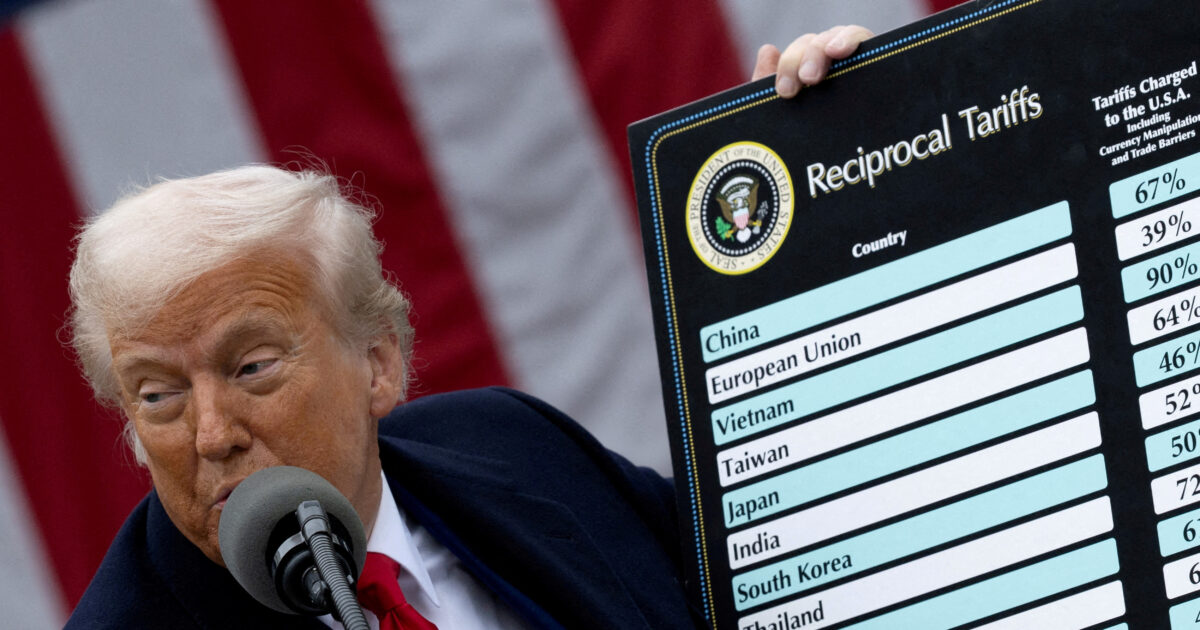The US trade relations are without tariff agreement EU The day before the quarterly final ultimatum given by the US president Donald Trump For tomorrow Wednesday (9.7.2025).
Especially after yesterday’s (7.7.2025) publication of Donald Trump two letters to the Heads of Japan and South Korea, which provide 25% of imports from these countries from August 1, 2025, in the European capitals that the US and the European Capitals will increase.
The latest Americans’ offer does not meet European expectations, according to Handelsblatt. It is one -sided, and the binding commitments for the most important industrial sectors – the automotive, steel and pharmaceuticals – are missing so far.
EU Commissioner Maros Shefkovic informed Monday night representatives of EU governments about the last situation of talks with Washington. “There is no agreement at the moment,” the Americans said, one participant said after the briefing.
Trump described the offer on Friday (4.7.2025) as an ultimatum: “Take it or leave it”. Pressure in Commission President Ursula von der Laien (CDU) is growing – from France, Spain and Denmark, but also from Germany, where Chancellor Friedrich Mertz (CDU) is in favor of a quick agreement.
In the European Commission, the fact that Trump had not sent a threatening letter to the EU by Monday night was considered positive.
The negotiations were still in progress and were hoped for a significant development to date (8.7.25) or tomorrow (9.7.25). The EU had made it clear to Americans that a solution was also expected for additional tariffs per sector. In the end, however, the decision belongs to Trump.
The US is already imposing an additional 25% on vehicles and car accessories and 50% on steel and aluminum products. And they also want to import new tariffs for the pharmaceutical industry – just the sectors in which the EU has significant export surpluses compared to the US. Trump wants to force these industries to produce in America.
Not only France, Spain and Denmark, which exercise the EU Council’s presidency from July, are taking distances from the results of the negotiations to date. Top officials in Berlin are also struggling with the question of whether a hasty agreement could endanger the basic interests of the EU industrial policy.
However, there is no evidence of agreement. Chancellor Mertz talked yesterday with the head of the Commission, French President Emmanuel Macron and Italian Prime Minister Georgia Meloni, which sign of increasing concern.
The comparison with the trade agreement between the US and the United Kingdom is particularly explosive. Many EU parliamentarians point out that Trump’s offer to the EU is no better, but rather worse. The EU has always emphasized that such a model was in no way coming for it.
“It is unacceptable that a framework agreement, which is not legally binding, is now under pressure, where central elements is completely unclear,” Bernd Lange (SPD), chairman of the European Parliament Committee, told Handelsblatt. “The two framework agreements that have been concluded so far with the United Kingdom and Vietnam are clearly unilaterally in favor of the US and bad agreements.”
CSU MEP Angelika Niebler disagreed: “We now urgently need a viable agreement in principle. Europe should not allow it to be blackmailed – but we have to decline without receding.” Daniel Caspary (CDU) also said: “The successful completion of the talks is in the interest of both sides. None of the transatlantic partners benefits from a commercial dispute.”
Trump divides the EU
The confrontation for the customs controversy makes it clear that von der Layen has not yet been able to find a relationship with Trump. The US president had said in May: “It’s so fantastic. I hope we meet. ” In fact, however, Trump has so far denied the chairman of the committee an appointment at the Oval Office – but has accepted Mertz, Meloni and Macron.
Things were different during Trump’s first term. The appearance of then Commission President Jean-Claude Juncker in the White House garden-a symbolic moment that prevented Trump’s threats against German cars, is unforgettable. Juncker had immediately responded to Trump’s steel duties for Harley-Davidson and whiskey, gaining respect.
Von der Layen, on the other hand, has so far declined to take countermeasures. After all, many see this as a strategic mistake. EU critical governments are talking about “weakness”. Unlike Juncker, he failed to negotiate with Trump on equal terms – and because he did not send a clear message of resistance. The Commission is negotiating with its hands tied.
Lange requires the EU not to “retreat” now, but “maintain a clear attitude and also sharpen our countermeasures. We are not a partner, we are economically and politically very confident about ourselves. “
The Chairman of the Internal Market Committee, Anna Cavazzini (Greens), also warns: “The EU should not accept vague promises. If, for example, the so -called agreement does not contain any arrangements on existing sectoral duties, the EU must apply the prepared countermeasures. “
In addition, EU exporters are already paying billions to customs duties. Her colleague at Rasmus Andresen said that the EU should not make “lazy compromises in the field of regulation of technology or tax policy”.
“Idist when it comes to duties, but with a clear advantage when it comes to the influence of technology oligarchs. This is what matters. Whether a vague document will really help us on these issues is doubtful. “
